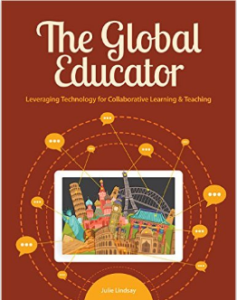 In March I talked to Julie Lindsay for the Absolutely Intercultural podcast about her latest book, The Global Educator (affiliate link). Along the way, Julie remarked on the fact that it was very difficult to get involved with European education projects if you are not in the EU and this made me think. I am very much involved in European Union projects and her comment made sense. It’s not that EU projects don’t welcome external partners, it is perhaps more that it is somewhat uncomfortable knowing that the EU partners get funded while the non-EU partners don’t. But apart from that, she is right that we should seek to include non-EU partners much more often. Julie starts at 20 minutes into the podcast below.
In March I talked to Julie Lindsay for the Absolutely Intercultural podcast about her latest book, The Global Educator (affiliate link). Along the way, Julie remarked on the fact that it was very difficult to get involved with European education projects if you are not in the EU and this made me think. I am very much involved in European Union projects and her comment made sense. It’s not that EU projects don’t welcome external partners, it is perhaps more that it is somewhat uncomfortable knowing that the EU partners get funded while the non-EU partners don’t. But apart from that, she is right that we should seek to include non-EU partners much more often. Julie starts at 20 minutes into the podcast below.
Julie’s message in The Global Educator is that it is imperative that all teachers, at all levels (even the very youngest), are able to connect their students to the world. This is a bold statement and a challenge to some teachers who fail to see the relevance. So Julie advocates starting local and gradually extending the reach of projects so that the global dimension is in the end an inevitable progression from learning locally, regionally and nationally.
From the blurb:
The book shares experiences from over 130 educators in K-12 and higher education including 36 case studies from across the world. It is a seminal work on the use of technology and pedagogy to connect learners for online global collaboration and co-creation.
There are plenty of opportunities in my own backyard currently to take a global perspective.
Brexit
As a Brit I had no vote in the recent referendum but will be hugely affected by the outcome in terms of mobility and pension to name but two areas. The referendum revealed that voters did not know much about the EU even after 3 months of campaigning. A global educator teacher could have ensured that her students were well-informed and have made European connections that touched her students on an emotional level.
Refugees
Here in my rural corner of Denmark, we are seeing many refugees who need help with learning a new language and generally settling in to a totally new country. One hears of the fears being built up elsewhere in the world about the dangers of allowing refugees into the US, eastern Europe and so on. But meeting face to face and trying to communicate unites us in humanity. And it helps to be more understanding of the refugees’ plight if you have an understanding of what global forces caused their flight in the first place.
Required skills
This video from the World Economic Forum highlights the importance of collaborative and communicative skills in the future workplace. The connection between being a global educator and preparing your students could not be clearer.
The book is available now in both paper and digital format. Julie Lindsay will be supporting the book with webinars, chats and discussions.
Note that the link to the book is an affiliate link. Any funds generated by ordering the book through this link will go towards supporting the running of the Absolutely Intercultural podcast.